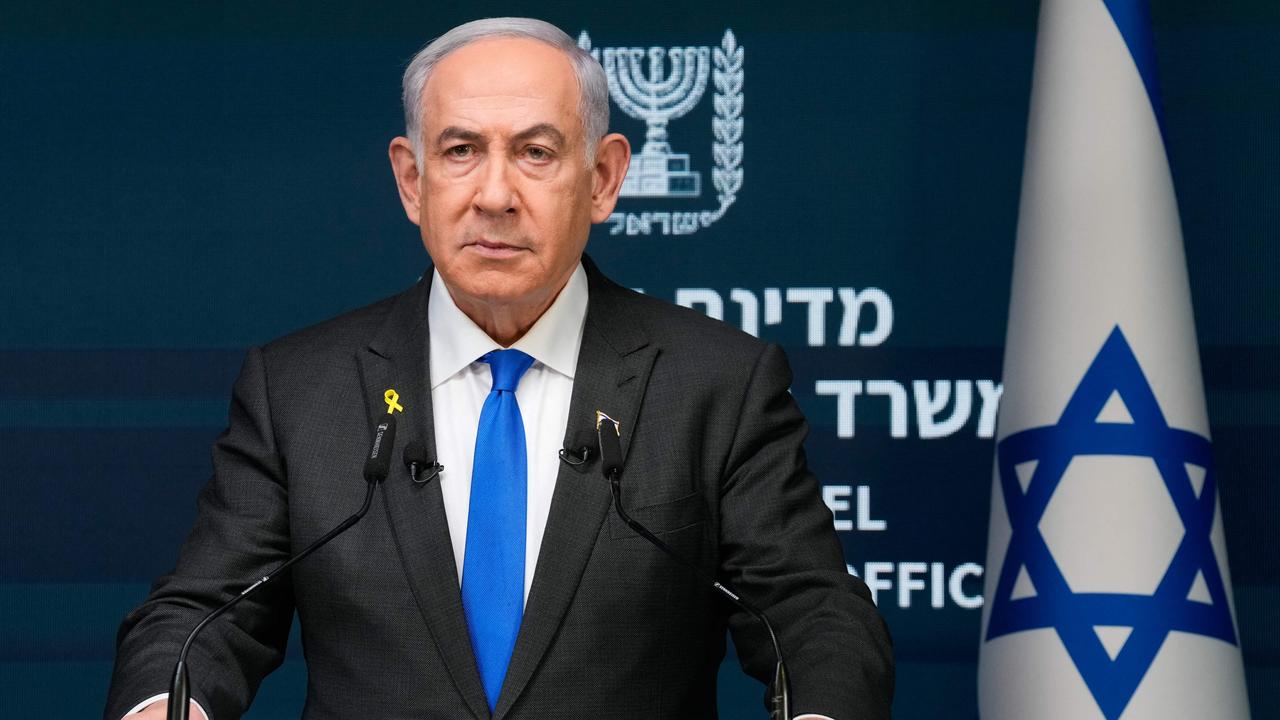Israel-Hamas war: Ceasefire hopes dim as Israel rejects calls to spare Rafah
Prospects for an Israel-Hamas ceasefire have dimmed after the US signalled it would veto the latest push for a UN Security Council resolution. Warning: Graphic. Follow updates.
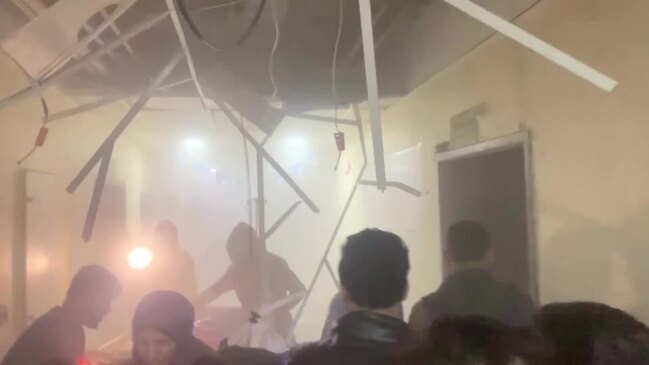
World
Don't miss out on the headlines from World. Followed categories will be added to My News.
Prospects for an Israel-Hamas ceasefire have dimmed after the United States signalled it would veto the latest push for a UN Security Council resolution and mediator Qatar acknowledged that truce talks on the other diplomatic front have hit an impasse.
The languishing efforts to pause the four-month-old war come as Israeli Prime Minister Benjamin Netanyahu vowed to reject international appeals to spare Gaza’s southernmost city Rafah, where an estimated 1.5 million people have sought refuge.
Israel’s relentless campaign to root out every Hamas battalion has edged closer to the city, with overnight attacks killing at least 10 Gazans there and in central Gaza’s Deir al-Balah, according to a tally by official Palestinian news agency Wafa.
Neighbouring Egypt has grown increasingly wary that an Israeli invasion of Rafah could force the Gazans trapped there across the border.
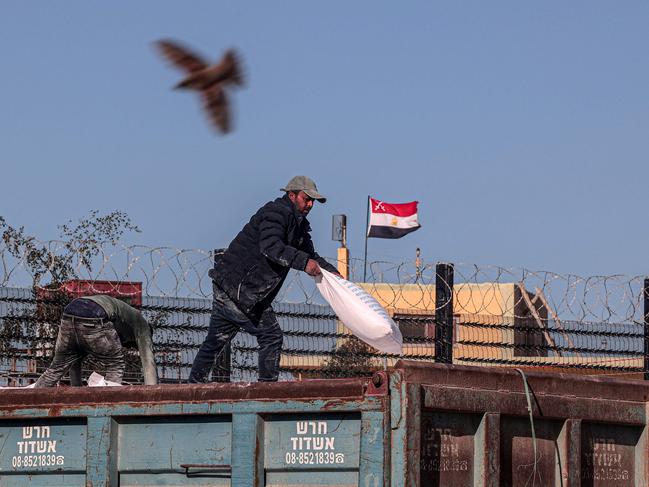
President Abdel Fattah al-Sisi reiterated Egypt’s opposition to any forced displacement into the Sinai desert.
In a phone call with French President Emmanuel Macron, both leaders agreed instead on the “necessity of the swift advancement of a ceasefire”.
Even if a temporary truce deal is struck at the talks in Cairo, Netanyahu said his troops’ ground invasion of Rafah will go ahead.
“Even if we achieve it, we will enter Rafah,” he said at a televised news conference Saturday.
Countries urging Israel otherwise are effectively saying “lose the war”, he said.
Next week’s possible United Nations Security Council vote appears unlikely to advance the ceasefire effort with Washington already voicing opposition.
“The United States does not support action on this draft resolution,” US Ambassador to the UN Linda Thomas-Greenfield said in a statement. “Should it come up for a vote as drafted, it will not be adopted.”
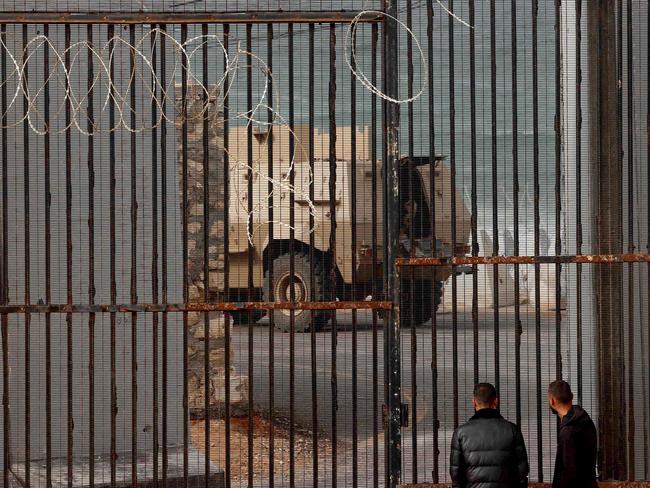
Algeria’s draft resolution seeks an immediate humanitarian ceasefire, but Thomas-Greenfield said the United States instead supports a truce-for-hostages deal that would pause fighting for six weeks.
US President Joe Biden had “multiple calls” with Netanyahu as well as Egyptian and Qatari leaders this week “to push this deal forward”, she said.
Speaking at the Munich Security Conference, Qatari Prime Minister Mohammed bin Abdulrahman Al-Thani called those talks “not very promising”.
He said the efforts had been complicated by the insistence of “a lot of countries” that any new truce involve further releases of hostages.
His assessment came as Hamas threatened to suspend its involvement in the talks unless relief supplies reach the north, where aid agencies have warned of looming famine.
FOLLOW BELOW FOR MORE UPDATES:
‘NEWBORNS AT A RISK OF DYING IN HOURS’: HEALTH MINISTRY WARNS
Israel said it had taken into custody 100 people at one of Gaza’s main hospitals after troops raided the facility, with fears mounting ON Saturday for patients and staff trapped inside.
The deadly bombardment of Gaza continued overnight with another 100 people killed in Israeli strikes, according to the Hamas-run health ministry.
At least 120 patients and five medical teams are stuck without water, food and electricity in the Nasser hospital in Gaza’s main southern city of Khan Yunis, according to the health ministry.
Israel has for weeks concentrated its military operations in Khan Yunis, the hometown of Hamas’s Gaza leader Yahya Sinwar, the alleged architect of the October 7 attack that triggered the war.
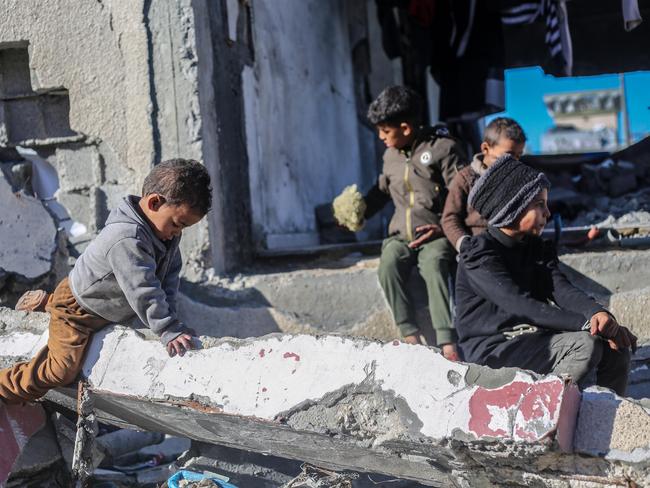
This week, intense fighting has raged around the Nasser hospital – one of the Palestinian territorY’s last remaining major medical facilities that remains even partly operational.
The power was cut and the generators had stopped after the raid, leading to the deaths of six patients due to a lack of oxygen, according to Gaza’s health ministry.
“New-born children are at a risk of dying in the next few hours,” the ministry warned Saturday.
Israel’s army said its troops entered the hospital on Thursday, acting on what it said was “credible intelligence” that hostages seized in the October 7 attack had been held there and that the bodies of some may still be inside.
On Saturday the military said it had detained 100 people from the hospital suspected of “terrorist activity”.
The army also said it had seized weapons and retrieved “medications with the names of Israeli hostages” in the hospital.
But the raid has been criticised by medics and the United Nations. The army has insisted it made every effort to keep the hospital supplied with power, including bringing in an alternative generator.
A witness, who declined to be named for safety reasons, told AFP the Israeli forces had shot “at anyone who moved inside the hospital”.
HAMAS SAYS GAZA HOSTAGES ‘STRUGGLING TO STAY ALIVE’
Hamas’ armed wing has claimed that hostages in Gaza were “struggling to stay alive” as conditions across the war-battered Palestinian territory deteriorate due to relentless Israeli bombardments.
“The wounded and sick enemy prisoners are going through very difficult conditions and are struggling to stay alive,” Abu Obeida, spokesman for Ezzedine al-Qassam Brigades said in a televised statement.
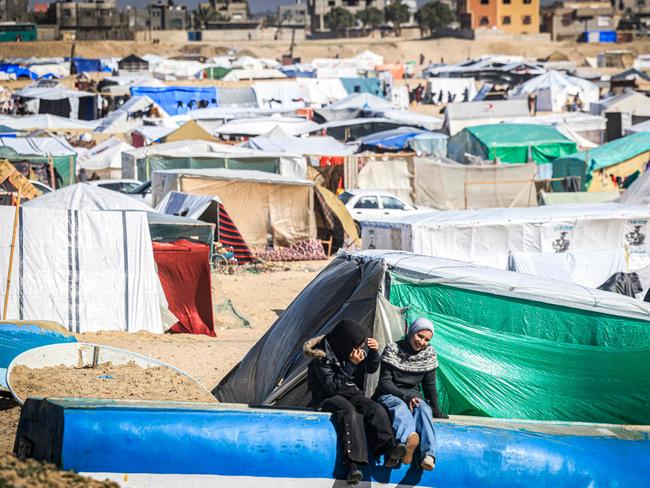
“This is not surprising because everything that our people are suffering from, be it hunger, thirst and lack of medical help, is also what the enemy prisoners are suffering from.”
This week, mediators from the United States, Qatar and Egypt gathered in Cairo to try to broker a deal to halt the fighting and secure the release of the remaining hostages in exchange for Palestinian prisoners held by Israel.
US Secretary of State Antony Blinken said on Thursday he believed a deal was still “possible” but there has been no public announcement of any breakthrough.
Abu Obeida said it was Israel’s military campaign in the Gaza Strip that was responsible for the situation.
“Time is running out fast,” he said.
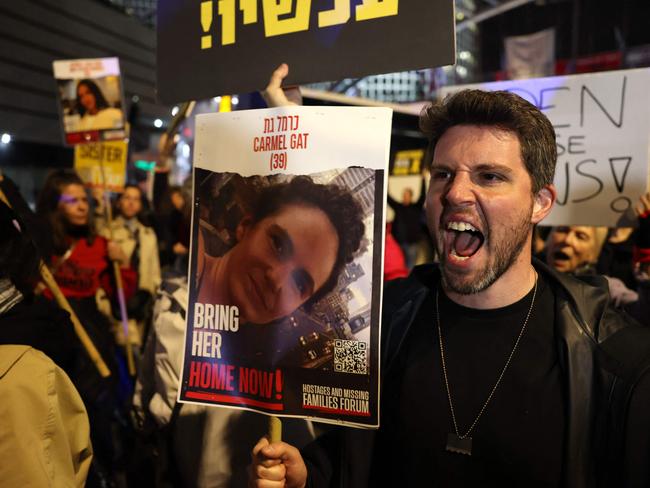
During the October 7 attack by Hamas militants on Israel, some 250 hostages were taken to the Gaza Strip, of which roughly 130 are still being held there, according to Israeli officials.
Thirty of them are believed to be dead, while more than 100 had been freed during a one-week truce that ended on December 1.
Three hostages were mistakenly killed by Israeli soldiers in December, while some have been rescued in military operations.
Several hostages among those still captive in Gaza are suffering from various illnesses and attempts have been made to supply medicines to them.
The October 7 attack itself resulted in the deaths of around 1,160 people in Israel, mostly civilians, according to an AFP tally based on Israeli figures.
In Israel’s relentless military offensive since then in Gaza, at least 28,775 people have been killed, most of them women and children, according to the territory’s health ministry.
CONCERN SURROUNDS GAZA HOSPITAL
Meanwhile, there was growing concern over a key Gaza hospital a day after a raid by the Israeli army, with the Hamas-run health ministry saying several patients had died there due to a lack of oxygen.
The health ministry said the power was cut off and the generators stopped after the raid at the Nasser hospital in the southern city of Khan Yunis, and that four patients had died Friday.
In recent days, intense fighting has raged in the vicinity of the hospital – one of the Palestinian territory’s last remaining major medical facilities that are still operational.
On Thursday, Israeli army spokesman Daniel Hagari said there was “credible intelligence” to suggest hostages seized by Gaza militants in the October 7 attack that sparked the war had been held at the hospital, and that bodies of some of the captives may still be inside.
But the military said later it had “not yet found any evidence of this”, although forces had found “weapons, grenades and mortar bombs” at the hospital complex.
On Friday it said Israeli forces had taken into custody more than “20 terrorists” suspected of involvement in the October 7 attack at the hospital.
A witness who declined to be named out of fear for their safety told AFP the army had shot “at anyone who moved inside the hospital”.
The health ministry also raised fears over the fate of six other patients in the intensive care unit and three children, saying it held Israel “responsible for the lives of patients and staff considering that the complex is now under its full control”.
‘BLATANT WAR CRIMES’: ISRAEL STORMS GAZA HOSPITAL
Israeli forces have raided Nasser Hospital in Khan Younis, southern Gaza’s largest remaining hospital, after shelling it and reportedly killing at least one patient.
Horror footage shows patients being taken out of their rooms in hospital gurneys, some screaming in pain through the sound of distant gunshots.
Other horrific scenes show dripping water mixed with blood on the floor, and dust and smoke filling the air, as people searched for survivors under the rubble using lights on their phones.
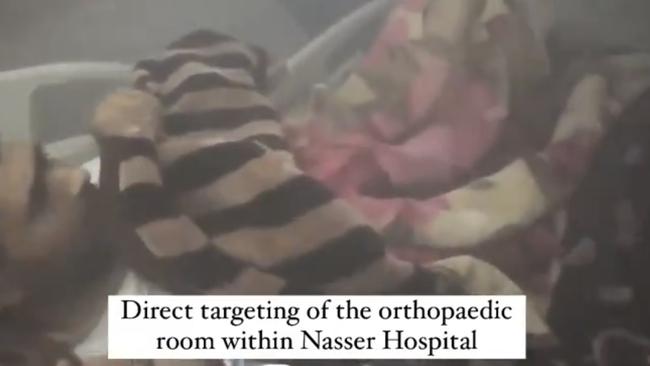
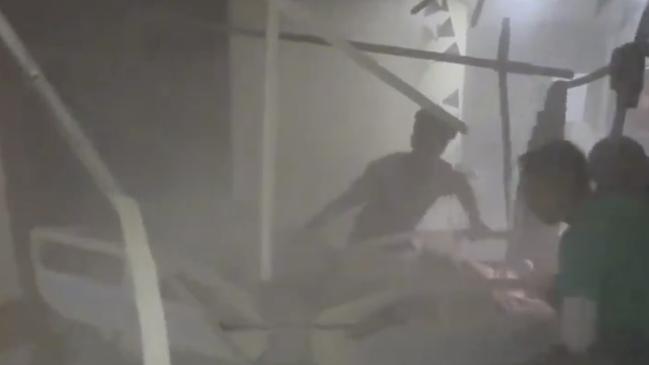
Gaza Health Ministry spokesman Ashraf al-Qudra says Israeli troops are forcing 95 medics, 191 patients and 165 displaced people into an old building at the medical centre under “harsh conditions” without food or milk for the children.
“The Nasser Medical Complex is witnessing a catastrophic, worrying situation because of the dwindling medical capacity as fuel is set to run out in the next 24 hours, which directly threatens the lives of patients, including six on respirators in intensive care and three children in incubators,” al-Qudra said in a statement.
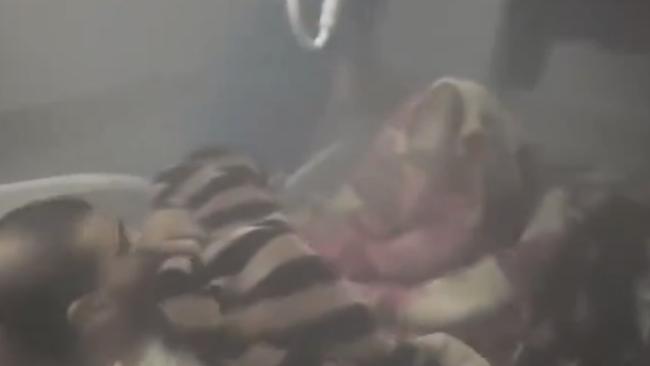
Gaza’s Government media office says the storming of the medical centre and turning it into a military base by Israel is a “blatant war crime” that violates all international treaties and standards.
“We hold the Israeli occupation and the international community and the United States fully responsible for the lives and safety of hundreds of medics and patients and wounded and displaced people still inside [the hospital],” the office said in a statement.
FOLLOW UPDATES BELOW:
ISRAEL BLOCKS FLOUR INTO GAZA
White House spokesman John Kirby has confirmed that Israel is preventing flour from reaching Gaza, where people are facing an imminent risk of famine.
“I wish I could tell you that flour was moving in, but I can’t do that right now. And all I can tell you is that it is absolutely critical as a staple for the Palestinian people,” Mr Kirby told reporters.
He added that Washington will continue to work with Israeli officials to get the aid into the besieged territory.
The Biden administration has faced mounting criticism for refusing to use its leverage over Israel to pressure it to adhere to Washington’s stated demands of increasing the humanitarian assistance flowing into Gaza and protecting civilians.
The White House is working with Congress to provide $US14bn in more aid to Israel.
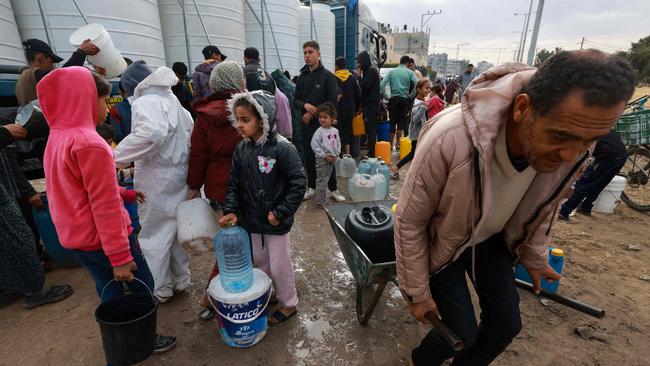
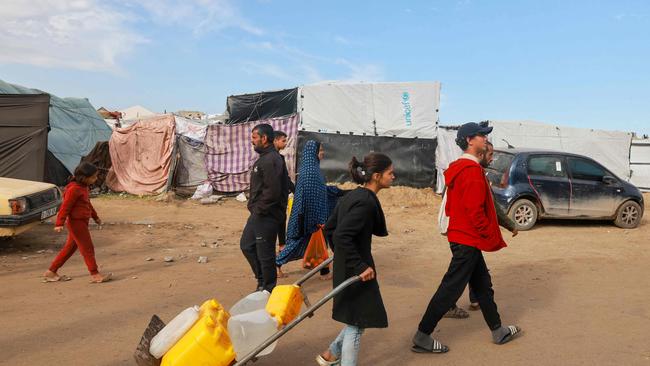
EGYPT BUILDING BUFFER ZONE NEAR GAZA
Egyptian authorities, fearful that an Israeli military push further into southern Gaza will set off a flood of refugees, are building an 8-square-mile walled enclosure in the Sinai Desert near the border, according to Egyptian officials and security analysts.
For weeks, Egypt has sought to bolster security along the frontier to keep Palestinians out, deploying soldiers and armoured vehicles and reinforcing fences.
The massive new compound is part of contingency plans if large numbers of Palestinians do manage to get in.
More than 100,000 people could be accommodated in the camp, Egyptian officials said. It is surrounded by concrete walls and far from any Egyptian settlements. Large numbers of tents, as yet unassembled, have been delivered to the site.
In the event of a major exodus of Palestinians from Gaza, Egypt would seek to limit the number of refugees to well below the capacity of the area – ideally to around 50,000 to 60,000 – Egyptian officials said.
Shocking footage shows unimaginable destruction inðŸ“#Gaza city, including our health centre.
— UNRWA (@UNRWA) February 15, 2024
+70% of civilian infrastructure- including homes, hospitals & schools- have been destroyed or severely damaged.
84% of health facilities have been affected by attacks.
Nowhere is safe. pic.twitter.com/9yRjJGvSMA
PROTESTERS BLOCK STREET IN TEL AVIV
Israeli media has posted video to X showing the families of Israeli captives held in Gaza protesting Prime Minister Netanyahu’s decision to not send a delegation to Cairo to continue negotiating with Hamas.
The protesters blocked Begin road in front of the Keria army base in Tel Aviv, Israeli broadcaster Channel 12 said.
Earlier today, media reports said that Netanyahu had effectively pulled out of truce talks, after dismissing Hamas’s response to an Israeli proposal nearly a week ago.
×”×¤×’× ×ª משפחות ×—×˜×•×¤×™× ×ž×—×•×¥ לקריה בתל ×ביב pic.twitter.com/Monav562y4
— החדשות - N12 (@N12News) February 15, 2024
FACILITY FOR VISUALLY IMPAIRED CHILDREN DESTROYED
The UNRWA says their facility for visually impaired children has been totally destroyed by Israeli air strikes.
“Nothing remains of UNRWA ‘s Rehabilitation Centre for Visually Impaired,” the UN’s Palestinian refugee agency says in a social media post.
“This centre was available to all visually impaired children across the Gaza Strip and provided braille machines, canes, visual aids + access to recreational activities including arts, sports & music.”
Footage from before the war shared by the organisation shows children in the facility learning how to type using braille.
Nothing remains of @UNRWA's Rehabilitation Centre for Visually Impaired.
— UNRWA (@UNRWA) February 15, 2024
This centre was available to all visually impaired children across theðŸ“#GazaStrip & provided braille machines, canes, visual aids + access to recreational activities including arts, sports & music. https://t.co/bpGUOpJO1Ypic.twitter.com/FM9hQyVv5J
AUSTRALIA, CANADA, NZ: ‘URGENT CEASEFIRE NEEDED’
The prime ministers of Canada, Australia and New Zealand have issued a joint statement saying a “humanitarian ceasefire is urgently needed” in Gaza and that they are “gravely concerned” about looming Israeli military operations in Rafah.
“A military operation into Rafah would be catastrophic. About 1.5 million Palestinians are taking refuge in the area, including many of our citizens and their families,” the statement reads.
“With the humanitarian situation in Gaza already dire, the impacts on Palestinian civilians from an expanded military operation would be devastating. We urge the Israeli government not to go down this path.”
The statement – co-signed by Prime Ministers Anthony Albanese, Justin Trudeau and Christopher Luxon – also said that Israel “must listen to its friends and it must listen to the international community” and that Palestinian civilians can’t be made to “pay the price of defeating Hamas”.
Joint statement with @JustinTrudeau and @chrisluxonmp. pic.twitter.com/Egqy6ZyrtZ
— Anthony Albanese (@AlboMP) February 15, 2024
This is not the first time that Australia, Canada and New Zealand have backed an immediate humanitarian ceasefire in Gaza.
All three were among 153 countries that voted in support of a UN General Assembly resolution calling for an immediate humanitarian ceasefire on December 13 last year.
Still, the joint statement issued by the prime ministers of three countries with strong ties to both the United States and Israel is notable in light of growing international concern about Israel’s planned ground invasion of Rafah.
Israel’s bombardment in the enclave has left more than 28,000 people dead, mostly women and children, according to Palestinian health authorities.
‘UNJUSTIFIABLE’: WONG’S MESSAGE TO ISRAEL
Penny Wong has made one of her strongest statements yet on the ongoing war in Gaza, declaring a planned Israeli ground offensive in Rafah would be “unjustifiable” and urged the Jewish state to “not go down this path”.
“The world is watching,” the Foreign Minister warned Israel in a statement to the foreign affairs senate estimates.
The Israeli military is planning an operation into Rafah, a small city at the southern end of the Gaza Strip which is currently sheltering about 1.5 million Palestinians, many of whom who have fled to the area since October 7.
Senator Wong said Australia strongly objected to the offensive, saying it would bring “devastation” to the innocent civilians seeking shelter.
“Large scale military opposite operations in densely populated areas risk extensive civilian casualties,” she said.
“Australia believes this would be unjustifiable.
“Our message to Israel is – listen to the world; do not go down this path.”
A major Israeli ground operation in densely populated Rafah would bring further devastation to more than a million civilians seeking shelter.
— Senator Penny Wong (@SenatorWong) February 15, 2024
Our message to Israel is: listen to the world; do not go down this path. pic.twitter.com/b8Ixx7XSHr
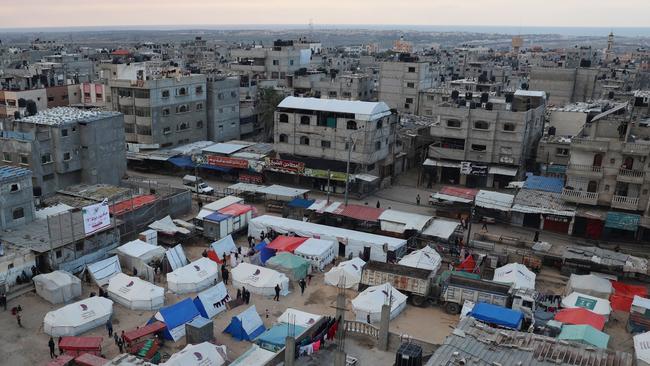
ISRAEL LAUNCHES DEADLY STRIKES ON LEBANON
Israel has launched its longest and heaviest attack on neighbouring Lebanon since the start of the Gaza war, killing at least nine civilians.
Israeli fighter jets began “an extensive wave of attacks in Lebanese territory” on Wednesday local time, Israeli Rear Adm. Daniel Hagari announced as the strikes were underway.
The Israeli strikes killed at least five people, including two Hezbollah fighters, the militant group said. Two children along with their mother were among the civilians killed.
Both sides have accused the other of increasing the scope of strikes in recent weeks, leading to fears that the conflict could widen at a time when Israel is planning to expand its offensive into Rafah, where more than one million people — half the population of the Gaza Strip — have taken shelter.
More than 100,000 Israelis living along the Lebanese border have been displaced since Hezbollah launched a series of cross-border strikes after the October 7 Hamas attack on southern Israel.
With Israeli strikes hitting deeper into Lebanese territory — and killing civilians — diplomats from the United States, Britain, France and the European Union have descended on Lebanon in efforts to head off a full-scale war.
US PROBES ISRAEL USE OF WHITE PHOSPHOROUS
The US is investigating several Israeli air strikes in Gaza that killed dozens of civilians and the possible use by Israel of white phosphorus in Lebanon, as part of a probe by the State Department to determine whether America’s closest ally has misused its bombs and missiles to kill civilians, US officials told The Wall Street Journal.
The process shows the dilemmas facing the Biden administration, which so far has ruled out putting conditions on arms transfers to pressure Israel, but faces increasing calls from some members of Congress to do so as the war wears on.
One attack the State Department is currently investigating is an October 31 air strike on the densely populated Jabalia refugee camp near Gaza City that killed more than 125 people, the US officials said.
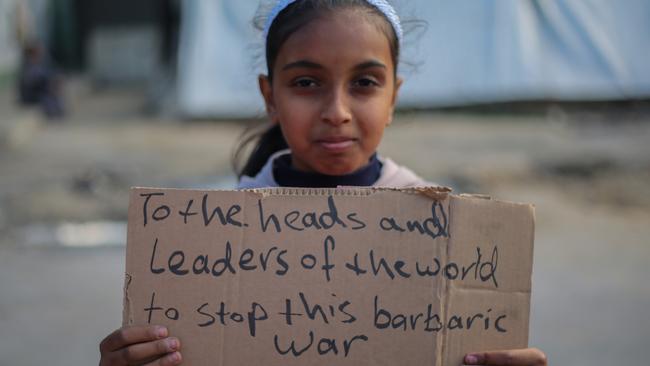
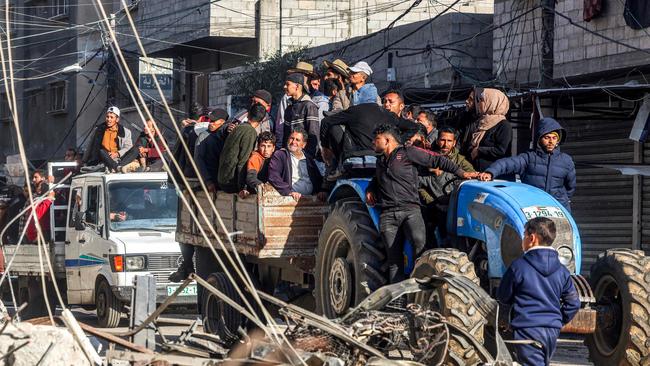
Weapons investigators suspect that Israel used a 2000-pound bomb in the strike, which could have been provided by the US The United Nations Human Rights Office said the strike killed a large number of civilians and could be a war crime.
Israeli officials declined to comment on what type of weapon they used, but said they had tried to minimise civilian casualties in the October 31 attack by using a delayed fuse that allowed it to detonate underground.
ELON MUSK’S STARLINK GETS GREEN LIGHT IN GAZA, ISRAEL
The Israeli government said it has approved the use of Starlink satellite services in a field hospital in the war-battered Gaza Strip, and in Israel for the first time.
“The Israeli security authorities approved the provision of Starlink services at the UAE’s field hospital operating in Rafah,” the Communications Ministry said in a statement.
“Starlink low-latency, high-speed connections will enable video conferencing with other hospitals and real-time remote diagnostics,” it said.
The Communications Ministry also said that Starlink — the satellite network of billionaire entrepreneur Elon Musk and the world’s largest satellite operator — will be enabled in Israel for the first time.
“The use of the company’s services will be limited at first with broader use expected in the future.”
Musk said in a posting on his social media platform X that he greatly appreciated Israel’s move, saying he hoped it would help both Israelis and Palestinian civilians in Gaza.
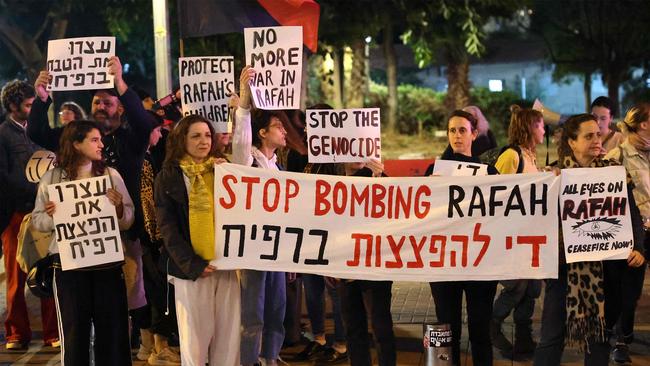
TRUCE TALKS ENTER SECOND DAY
Negotiations to pause the Israel-Hamas war and free the remaining hostages have headed into a second day in Cairo, as displaced Gazans braced for an expected Israeli assault on their last refuge of Rafah.
A Hamas source said that a delegation was headed to the Egyptian capital to meet Egyptian and Qatari mediators, after Israeli negotiators held talks with the mediators on Tuesday.
Turkish President Recep Tayyip Erdogan, an outspoken critic of Israel’s conduct of the Gaza war, was also due in Cairo on Wednesday for talks with President Abdel Fattah al-Sisi.
CIA Director William Burns had joined earlier talks with David Barnea, head of Israel’s Mossad intelligence service, which Egyptian media said had been mostly “positive”.
US National Security Council spokesman John Kirby described the negotiations as “constructive and moving in the right direction”.
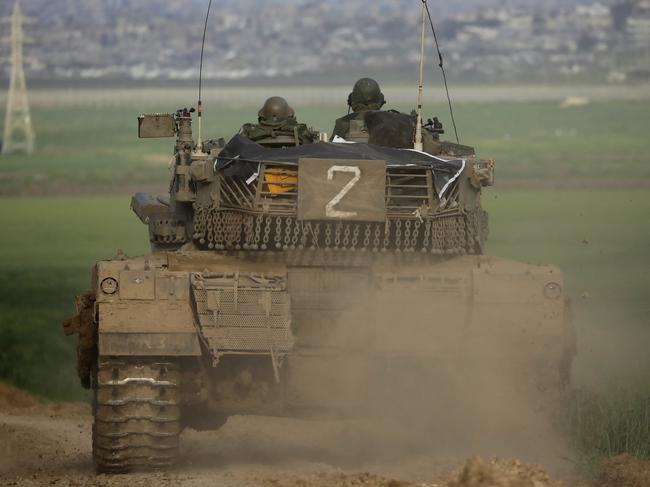
Mediators are racing to secure a pause to the fighting before Israel proceeds with a full-scale ground incursion into the Gaza Strip’s far-southern city of Rafah, where more than 1.4 million Palestinians are trapped.
The potential for mass civilian casualties has triggered urgent appeals, even from close allies, for Israel to hold off sending troops into the last major population centre they have yet to enter in the four-month war.
Key ally the United States has said it will not back any ground operation in Rafah without a “credible plan” for protecting civilians.
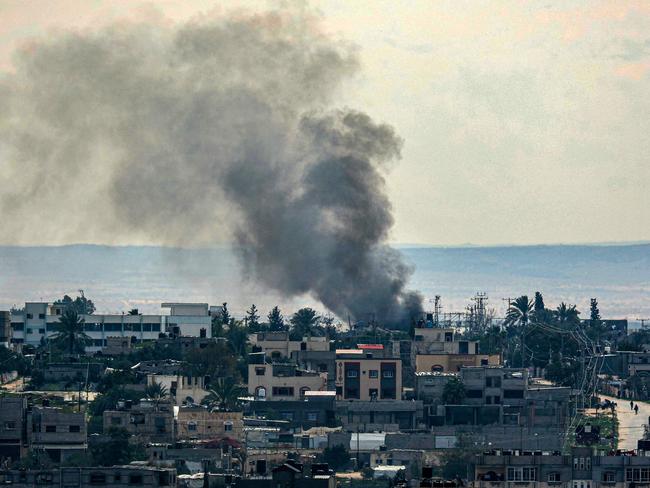
Rafah is the main entry point for desperately needed relief supplies and UN agencies have warned of a humanitarian disaster if an assault goes ahead.
UN humanitarian chief Martin Griffiths said any military operation “could lead to a slaughter”.
Terrified civilians have been locked in a desperate search for safety.
“My three children were injured, where can I go?” Dana Abu Chaaban asked at the city’s border crossing with Egypt, where she was hoping to be allowed across with her bandaged-up sons.
EGYPT UNDER PRESSURE TO OPEN BORDER
Pressure has grown on Egypt to open its border to Palestinian civilians, hundreds of thousands of whom have sought shelter in makeshift camps by the border where they face outbreaks of hepatitis and diarrhoea and a scarcity of food and water.
But it remains closed to Gazans.
“For 100 days we enter the crossing and beg them to let us cross, or to do anything to help us,” Habiba Nakhala said.
US President Joe Biden has said civilians in Rafah “need to be protected”, calling them “exposed and vulnerable”.

But Israeli Prime Minister Benjamin Netanyahu has said “complete victory” cannot be achieved without the elimination of Hamas’s last battalions in Rafah.
As the truce talks go on in Cairo, the Israeli military has kept up its bombardment of Gaza. The health ministry in the Hamas-run territory said Wednesday that 104 people had been killed overnight.
Late Tuesday, the military released a video it said was from a security camera and showed Gaza’s Hamas chief Yahya Sinwar and family members escaping through a tunnel days after the October 7 attack that launched the war.
“The hunt will not stop until he is captured alive or dead,” Israeli army spokesman Daniel Hagari told reporters.
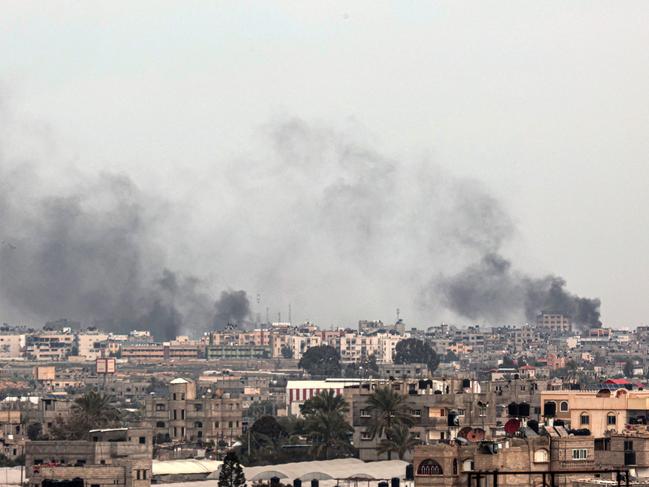
Some Gazans in Rafah were already packing up their belongings in readiness to move but others vowed to stay put, fearing even greater misery in the bombed-out hometowns they fled.
Ahlam Abu Assi said she “would rather die” in Rafah than return to the famine-like conditions facing relatives who stayed in Gaza City.
“My son and his children have nothing to eat. They cook a handful of rice and save it for the next day,” she told AFP. “My grandson cries from hunger.”
– with AFP
More Coverage
Originally published as Israel-Hamas war: Ceasefire hopes dim as Israel rejects calls to spare Rafah
Read related topics:Israel Conflict




